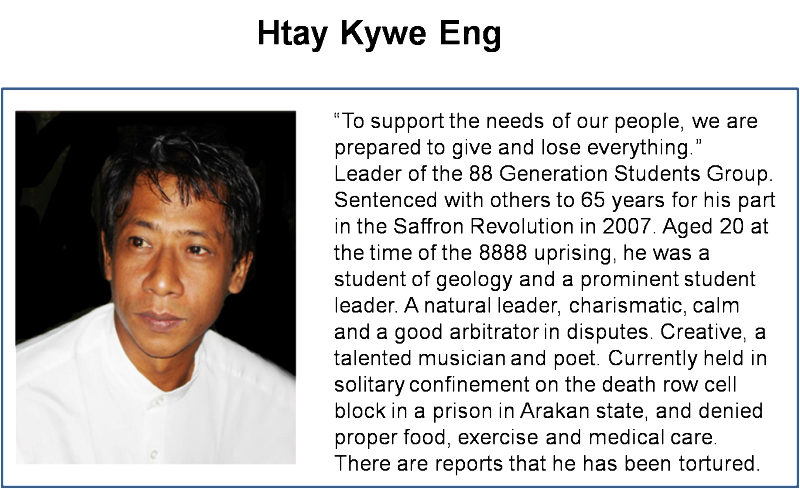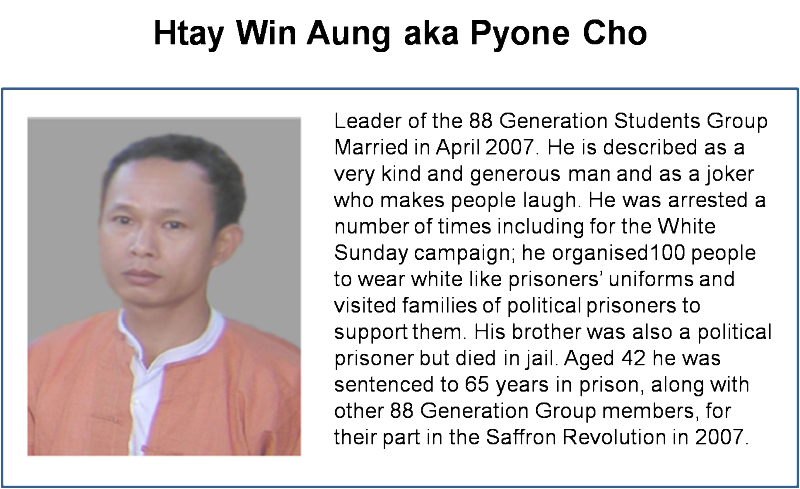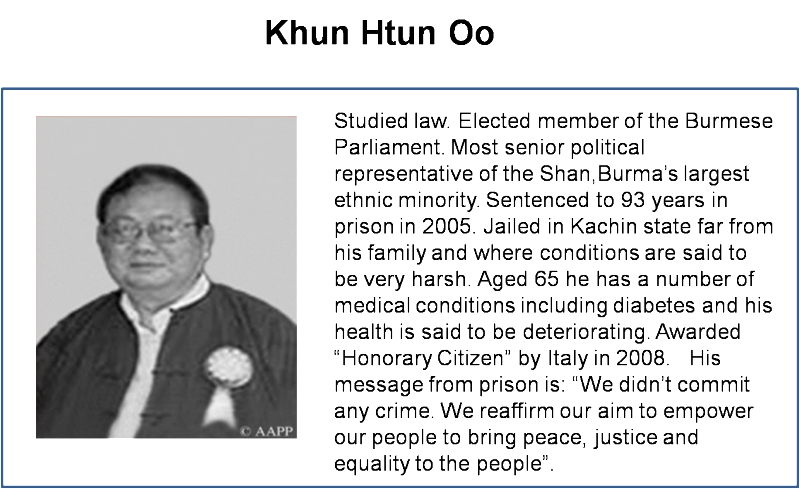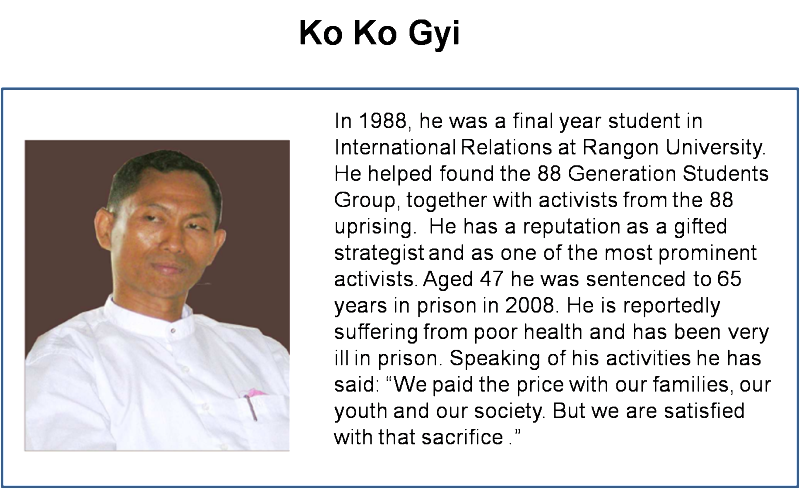The following article is written by British Prime Minister Gordon Brown. TOC thanks Mr Brown for allowing us to publish it here. (Picture from Magnum Photos.) (Read also: Shame on you, ASEAN by the Jakarta Post).

Gordon Brown / Prime Minister, Britain
The appalling but inevitable outcome of Aung San Suu Kyi’s sham trial is final proof that the military regime in Burma is determined to continue defying the world.
Depressing news that she has been sentenced to up to 1.5 years further house arrest is not only a tragedy for her and her family but also for the Burmese people who suffer daily at the hand of tyranny.
This was the moment for the Generals to embrace the growing clamour for change and choose the path of reform demanded by the region and the global community.
They comprehensively shunned it. The charges were baseless, the verdict outrageous.
So the international community must respond to this latest injustice with a clear message to the junta that its tyrannical actions will no longer be tolerated.
Further sanctions to target directly the regime’s economic interests have been agreed by the EU in response to the verdict and must be implemented as quickly as possible.
And determined action in the UN Security Council must follow. Nothing less than a world wide ban on the sale of arms to the regime will do as a first step.
I also believe that we should identify and target those judges complicit in these political show trials, which are an absurd mockery of justice.
The Generals should be in no doubt about the strength of international solidarity with the cause of freedom, democracy and development in Burma.
Political and humanitarian conditions in the country continue to deteriorate.
When over 140,000 were killed and millions made destitute by Cyclone Nargis last year the world’s efforts to help were resisted, a peaceful uprising by monks in 2007 was violently quashed, ethnic minorities are persecuted and under armed attack.
The media is muzzled, freedom of speech and assembly are non-existent and the number of political prisoners – jailed only for their unwavering commitment to peace and national reconciliation – has doubled to more than 2000.
Aung San Suu Kyi is the most high profile of them.
She has long been a symbol of hope and defiance during her 14 years as a prisoner of conscience.
She is a most courageous woman. In those long years of isolation, she has barely seen her two sons yet is resolute in her faith in democracy and the Burmese people.
Her refusal to buckle in the face of tyranny is an inspiration.
The façade of her prosecution is made more monstrous, therefore, because its real objective is to sever her bond with the people for whom she is a beacon of hope and resistance.
Her treatment can only be read as the junta’s reluctance to move towards freedom, democracy and rule of law with Aung San Suu Kyi a central figure in a new Burma.
So unless they immediately free her – and all political prisoners – and start genuine dialogue with opposition and ethnic groups elections next year will have no credibility.
In July, UN Secretary-General Ban Ki Moon demanded such measures on a visit to Rangoon. With this verdict, the Generals have publicly snubbed him.
Now comes our greatest test.
In the face of this arrogance, we cannot stand by and effectively sanction the abhorrent actions of a violent and repressive junta – but show them that the international community is united and coordinated in its response.
We have seen an extraordinary consensus building around the world against the Burmese regime, encompassing the UN, the EU, ASEAN and more than 45 heads of state.
All of us must continue to push for genuine political reconciliation and change, especially those countries in the region with the greatest influence.
Burma is rich in natural and human resources and sits at the heart of a dynamic continent. Democratic reform would unleash the country’s enormous potential.
And I have always made clear that the UK would respond positively to any signs of progress but attitudes must harden in the light of this verdict.
The Generals are condemning the country and its people to ever deeper isolation, poverty, conflict and despair.
Some may question why Burma warrants so much attention. There are other countries where human rights are ignored or people live in poverty.
But the Burmese regime stands virtually alone in the scale of its misrule and the sheer indifference to the daily suffering of its 50 million people.
Once again my thoughts are with Aung San Suu Kyi – the human face of Burma’s tragedy. But words and thoughts are no longer enough.
——
IVAN LEWIS
MINISTER OF STATE FOR FOREIGN AND COMMONWEALTH AFFAIRS ON THE 8888 POLITICAL PRISONERS
This Saturday 8 August is the 21st anniversary of the 8888 Popular Uprising in Burma. It began as a student protest about corrupt government and economic mismanagement in Rangoon but spread throughout the country. The students were joined in their protests by people from all walks of life – saffron-robed monks, teachers, young children, housewives and doctors. A general strike took place on 8 August 1988, an auspicious date. But Burma’s first popular uprising was put down the next month in the most bloody and ruthless manner. A brutal repression of the people that has continued to this day, and which we last witnessed in the beating and killing of monks and civilians in November 2008.
It was 8888 that brought Aung Sang Suu Kyi (ASSK) to the forefront of the struggle for democracy, freedom and civil liberties . ASSK is the best known of Burma’s political prisoners and she is the Burmese people’s beacon of hope. But she is currently subject to a political show trial and faces the prospect of a prison sentence on 11 August – a date the regime have set to avoid the anniversary of 8888, and because the Senior General believes 11 is his lucky number. Relying on numbers, lucky or otherwise, is a poor substitute for a clear strategic choice of an inclusive democracy.
ASSK’s plight also highlights the appalling plight of the over 2100 other political prisoners. Here, to commemorate the 21st anniversary of 8888, are a few of these other political prisoners. It is important that we know their stories.
Like ASSK, their stories are heart-rending. They are people with families from whom they are separated. Many of them are sentenced for decades, two from minority ethnic groups have been sentenced to over 100 years each. The regime wants to ensure its critics die in prison. They are people from different ethnic backgrounds and walks of life – Shan, Mon, Burman, lawyers, artists, activists, MPs, a comedian. They are talented people with professional qualifications. Their incarceration demonstrates how much human potential goes unrealised in Burma. Their diversity demonstrates that the regime does not discriminate – all dissent in any form is brutally crushed.
What these political prisoners have in common with each other, and what the regime has against them, is an unwavering commitment to peace and national reconciliation.
On the anniversary of 8888, I want to pay tribute to all Burma’s political prisoners. Their courage and resilience in the face of the abuse of their fundamental human rights is humbling. I also want to repeat the international community’s call to the Burmese regime to release unconditionally all political prisoners, and commit to a genuine and inclusive process of dialogue and national reconciliation. Until they do so, future elections, such as those they plan for 2010 will have absolutely no legitimacy.
—–
The following are some of the political prisoners presently incarcerated by the Burmese military junta:











